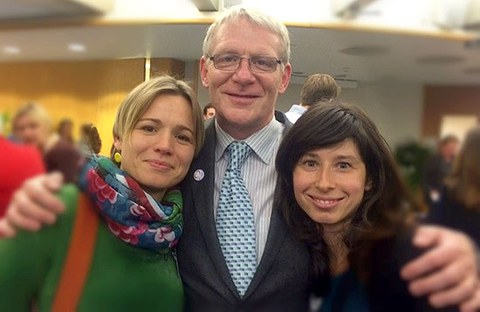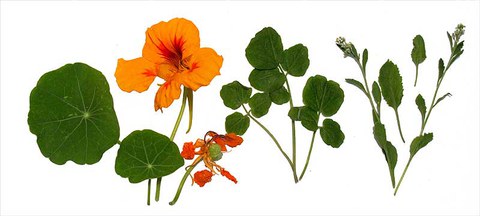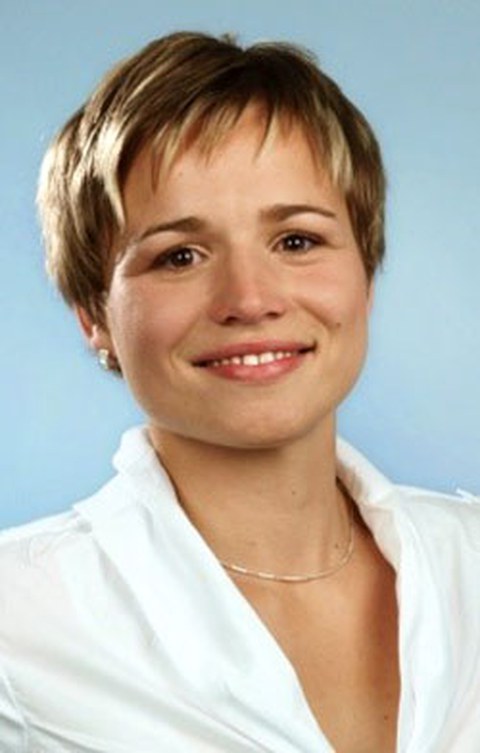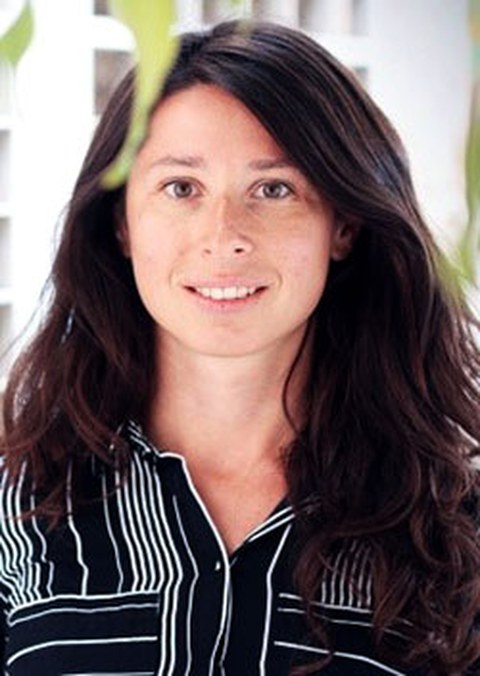DOCTORS WITH HEART, MIND AND COURAGE
(Interview from 2018)
Dagmar Möbius
As early as their days of studying medicine, Marie Downar and Oxana Atmann questioned commonly entrenched ideas and dared to venture into new territory. Together with the national non-profit organization Medizin und Menschlichkeit (“Medicine and Compassion”), they organized the symposium ZUKUNFT:MEDIZIN (“FUTURE:MEDICINE”) in Dresden.
They now live farther apart, but have remained close friends over the years. And for these doctors of medicine, every day is still a school day. A Skype interview between Dresden, Munich and Berlin.
Marie and Oxana, you have quite a bit in common. You were both born in 1983, you both come from Brandenburg and you both began studying medicine at just 20 years old, finishing at TU Dresden in 2010 and 2011, respectively. Why did you want to become doctors?
Dr. Marie Downar: There wasn’t a particular moment when I thought, “I want to become a doctor!” However, as a child, I watched my grandfather suffer a great deal. He was severely ill, but he just couldn’t go in peace. This raised a lot of questions for me. I also considered studying philosophy, literature or journalism, but that would have entailed more of an outsider perspective. I was also interested in biotechnology. Human medicine turned out to be the perfect middle ground where I could be involved in a hands-on capacity. I was looking for answers. Medicine covers health maintenance, healing and guidance for people in every stage of life – from the cradle to the grave. As a natural and empirical science, it is directly concerned with the how and why of all life processes. I don’t regret my decision for a second.
Dr. Oxana Atmann: I wasn’t always fixated on medicine, but I have been interested in the composition of the human body from a young age. I spent one school year in the United States, which gave me some guidance regarding the path my life could take and piqued my interest in medicine. Then, I was lucky enough to meet a wonderful holistic general practitioner in Freiberg, where I grew up. She helped me become who I am today. I became interested both in natural science and in everything spiritual. Medicine brings together the unexplainable, human wonder and hard, scientific facts. I thrive from this combination.

Dr. Marie Downar (left) and Dr. Oxana Atmann (right) with Dr. Robin Youngson (center)
Did you know right away that you wanted to study in Dresden?
OA: After taking the first section of the exam to become a doctor in Rostock, I decided to move back to Saxony, where I continued my main course of study at TU Dresden’s Faculty of Medicine. I still remember how smoothly the transition went because everything was so well-structured – with one campus and a well-organized degree program. This meant that I could turn my full attention to the medical content and interactions with various fields. Since the Faculty of Medicine is physically separate from the TU Campus, I feel more like a Carl-Gustav-Carus graduate than anything else. Founded in 1993, the Faculty is relatively young and has always been open to change. During my time there, student evaluations were taken seriously and had the power to change portions of the curriculum quickly and with long-term positive effects for the program. So, I had the sense that I could actively participate in the goings on within the Faculty.
MD: What and where were intricately intertwined. At TU Dresden, I felt like I had free rein over my research and that I could really quench my thirst for knowledge. The human medicine degree program in Dresden was a novelty in Germany at the time, as it placed greater focus on integrative problem, practice and patient-oriented learning (known as the DIPOL concept) and effectively interweaved theory and practice. I really felt like I could put my heart and soul into becoming a doctor here. The atmosphere at the university really felt innovative and dynamic, especially for its time. The university is located in a city embedded in tradition, but one that is large enough to serve as a gateway to the world. At the same time, you don’t get lost in a sea of people. I was thrilled when my acceptance letter for Dresden arrived after my nursing internship because I was certain that I would flourish here. I am so grateful that I had the opportunity to study at TU Dresden – I am well aware of this privilege.
How would you assess the knowledge and skills acquired during your studies?
OA: The practical course of study comprised many interactive portions based on work in smaller groups, which was excellent preparation for working as a doctor and even more so for the State Examination. This allowed us to create a stable foundation for our later work in health care as doctors and on an interpersonal level. My doctoral studies under Professor Thomas Hummel from the “Smell and Taste” Interdisciplinary Center at the Department of Otorhinolaryngology helped me acquire the basic academic research skills that I still use and continue to build on as a medical research assistant at the Institute for General Practice within the Klinikum rechts der Isar at TU Munich. I am so thankful that he allowed me to work independently right from the get-go and that the international team accepted me with open arms.
MD: Medical students were allowed to shadow and assist in every department. The time during which I wrote my experimental doctoral thesis in the Radiation Therapy Department of the University Hospital was extremely beneficial – from a technical and interpersonal perspective. I was encouraged and expected to do a lot both academically and in the clinic, and these aspects were very closely linked. I also gained a sense of how to approach difficult situations in all areas of oncology. We also had clinical team supervision, where we were given the opportunity to ask questions, and compare and reflect on our experiences. I wish that I had had this chance in all areas of my medical studies.
You’ve both had experience abroad …
MD: Yes, I had a very hands-on experience organizing the clinical clerkship exchange program with Wrocław Medical University and helping to establish the Erasmus study abroad program there. I was given a lot of leeway, but the DIPOL curriculum proved to be more of a hindrance in this setting, as reconciling it with curricula from foreign universities required a great deal of administrative work. For example, I had to completely reorganize my fourth year of study to be able to spend the fifth in Wrocław.
OA: I completed various portions of my studies abroad, including in Brisbane, Australia; Wattwil, Switzerland; Murcia, Spain; and Tangshan, China, for which I received a scholarship from the German-Chinese Society (Deutsch-Chinesische Gesellschaft e. V.).

Nasturtium strengthens the immune system and has antibiotic effects
And you even enriched the program on your own initiative. How did you go about doing this?
OA: During my studies, I became fascinated by the healing capabilities of plants and wanted to learn more about them. So, we launched the elective in phytopharmacology, in which students had to take a final examination to earn a certificate. We organized the voluntary course all on our own – it ran for a semester and filled up so quickly that there weren’t enough seats to accommodate everyone who wanted to take it. Professor Erich Wettwer from Pharmacology provided his full support in the run-up to and during the course. I was surprised to find out just how many medicinal plants can be found in TU Dresden’s Botanical Garden. What really stuck in my mind was the nasturtium, which strengthens the immune system and has antibiotic effects.
MD: Yes, getting this phytopharmacology course up and running at such short notice was really a feat to remember. It makes sense to learn about the origins of medicine and how herbal medicine can still be used today. For example, in addition to other measures, treating tumors arising in the head and neck with radiation therapy should be supplemented with good oral hygiene. This includes rinsing with sage tea to attenuate very painful inflammations of the oral mucosa caused by the radiation. During our phytopharmacology course, we paid a visit to the Bombastus-Werke – a producer of pharmaceuticals and natural remedies in Freital. There we learned how sage is grown and how its components are processed into tea or mouthwash. That was when everything really came together.
Bombastus-Werke is one of the largest industrial cultivators of perennial sage in Europe and, according to its own research, the largest company in the world to use the entire plant – from the root to the flower. Its premises stretch over about 40 hectares around Freital-Wurgwitz. The majority of its sage plants are processed into tea. However, Bombastus also uses its sage for about 20 other products, for instance for ointments, mouthwashes or toothpaste. www.bombastus.de
Marie, you had another life-changing experience during your studies …
MD: The birth of our daughter in 2009 and the subsequent period of intensive treatment interrupted my studies to a large extent and caused me to question many things, but it also meant that we gained a lot of personal experience from a patient’s perspective. However, it was difficult to do my practical year full-time and to study for the final State Examination.
How were you able to reach the goals you had as a result of your experience?

Dr. med. Marie Downar
MD: I am grateful to my colleagues for our repeated discussions of ethical dilemmas, crises of purpose and the meaning of life during our free time.
Oxana and I found a space for discourse and reflection at the non-profit Medizin und Menschlichkeit’s spring academy. We met other medical students and doctors who were particularly passionate about proficiency in areas of medicine beyond the purely technical, including communication, improved interpersonal contact and handling critical situations, just to name a few. I also met many older colleagues there who inspired me. For example, ENT specialist and dentist Dr. med. Jochen Gleditsch who, at over 80 years old, looked at me – then 29 – and told me, “You still have so much time.” That encouraged me to cut down to working part-time and to plan my specialist training so that I would have time for our children. I was met with organizational challenges, particularly in the clinic, and to an extent felt the silent accusation that “a good doctor is available for their patients around the clock.”
At the same time, a colleague of mine gifted me the book Time to Care, in which the internationally renowned New Zealand-based anesthesiologist and former clinic director Dr. Robin Youngson had compiled noteworthy and sometimes self-evident information in a scientifically substantiated and experience-based manual. I couldn’t find comparable practical and motivating literature in German at that time, but what I read was so helpful that I thought German-speaking professionals should be able to benefit from this work and constructively implement its teachings. “Why reinvent the wheel?” I thought to myself, and set out translating the book myself. I’ll be attending an event on an Economy for the Common Good in the health care system later this month and I’m eager to hear what ideas people present.
I hope that we only get better at utilizing the now readily available resources so that medicine accommodates everyone. We must continue to question excessive bureaucratic and economic constraints. And we must also establish basic conditions that better support a fulfilling working life – in urban and rural settings, in outpatient and inpatient clinics – as well as overall patient welfare. So, it is crucial that we create spaces for interpersonal exchange regardless of experience or hierarchy and across all health professions, including and especially during medical studies, but also extending into professional life. I am ready to offer my own contribution.
OA: I am currently enrolled in a part-time Master’s degree program in Health Management at Apollon University Bremen. I’m interested in the business side of things and it seems to me that economics and medicine are currently at odds. Can the intent to turn a profit be reconciled with the Hippocratic oath? Throughout my studies, I’ve had inspiring and provocative conversations with economists and I’ve acquired a vast amount of knowledge. I hope to use this experience to help contribute to a balanced medical field that has the common good in mind.
For seven years now, you have both been involved with Medizin und Menschlichkeit. In 2016, you organized the symposium ZUKUNFT:MEDIZIN in Dresden. What has been your motivation?

Dr. med. Oxana Atmann
OA: It is the job of a medical professional to ease suffering and prevent illness. But in a world where economic interests shape the power, leadership and performance structures in health care, doctors are often forced to choose between the ethical solution and the profitable one. We must actively work to maintain the joy of medical care, where the focus is on the people. This demands resolute health care workers who are ready to take action and dare to break new ground together. It requires the will to create a human-oriented health care system that cooperatively and transparently works to promote all sectors of society equally.
MD: We came up with the idea to organize the symposium the first time we met Dr. Robin Youngson, the author of Time to Care, at the Faculty of Medicine in Groningen (Netherlands) on the occasion of the Dutch translation of his book being published. He offered to come to the German book premiere in Dresden straight away.
No sooner said than done – one-and-a-half years later, the symposium was held with abundant support at our University Hospital under the patronage of Professor Anje Bergmann from the Chair of General Medicine at TU Dresden’s Faculty of Medicine. Workshops led by Dr. Youngson and organizations like Was hab’ ich?, Spiegelneuronen, Arzt mit Humor and Medizin und Menschlichkeit as well as an inspiring intergenerational discourse led by Dialog der Generationen touched on all the aspects Oxana just mentioned. Around 70 enthusiastic and engaged participants attended the event.
The Association of Friends and Sponsors of TU Dresden, the Saxon Association of General Practitioners (Sächsischer Hausärzteverband) and other organizations showed great interest in your work subsequent to the event. What are your plans for the future?
MD: First and foremost, we are delighted to be able to give something back to our alma mater. We are grateful for all the doors that have opened along the way. Hopefully, there will be many more of these scientific events to come. Personally, I’m currently on parental leave for the second time and plan to continue my specialist training in Dresden afterwards. I am totally open to whatever opportunities arise after that.
OA: I’m planning to finish up my Master’s degree this year. I’ve been working on research projects on patient training, health competence, eHealth and other health care issues and involved in developing didactic concepts in medicine at the Klinikum rechts der Isar in Munich since 2017. I would also like to finish up my specialist training and continue my involvement with the world of economics. I enjoy working with Marie, particularly in connection with the question of how the health care system can serve the health of everyone. Maybe our next project is waiting for us just around the corner. (Laughter.)
I wish you both all the best. Thank you for sitting down with me today.
Update 2021
Three years after the Alumni Portrait, both doctors continue to meet up on a regular basis and consolidate their skills with empathy, authentic encounters and a people-first attitude both in health care and beyond.
Dr. Downar has managed to balance her medical work at her practice for pain management and general medicine with the growth of her family.
Following Dr. Atmann’s three-year research and teaching tenure at the Klinikum rechts der Isar in Munich, she pursued her specialist training at general medical practices in and around the city. During this time, she also attained her Master’s in Health Management (MaHM) and her Certificate for Didactics in Higher Education.
Medizin and Menschlichkeit (MuM) is still very active on a national scale. In addition to the MuM summer academy, the organization will host a conference on “New Work Medicine” as well as an integrative fasting week in September 2021, taking place on the grounds of the former Waldhof Elgershausen clinic.
Beyond individual efforts, stable structures on every level of society are necessary to adequately balance and connect work, family, personal growth and a medical field that truly works to make everyone healthier. "Getting these and others off the ground continues to be our ultimate goal."
Contact:
c/o Dr. med. Oxana Atmann, Munich
Email
